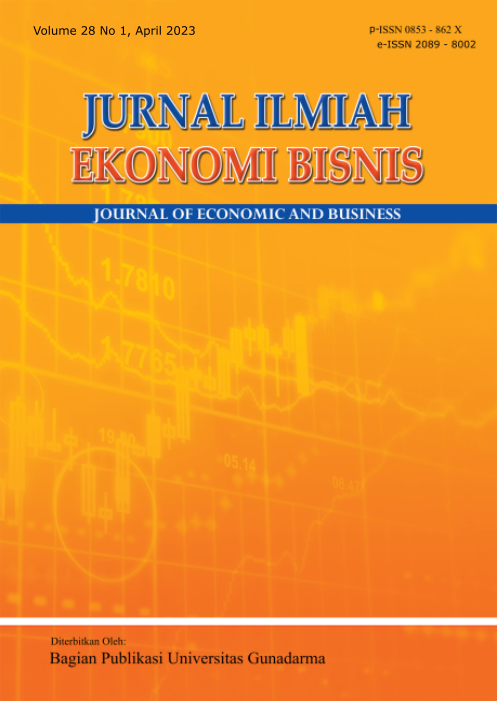THE INFLUENCE OF MONEY ATTITUDE ON FINANCIAL WELL-BEING ON MARRIED WORKERS
Gunadarma University
Indonesia
Gunadarma University
Indonesia
Gunadarma University
Indonesia
Abstract
The Covid-19 pandemic has caused several changes in various sectors of life. The most noticeable change is in economic conditions. In the current post-pandemic situations, people have also changed their perception about the concept of financial well-being. According to several studies, financial well-being is influenced by several factors, one of them is money attitude. The purpose of this study is to determine the influence of money attitude on financial well-being on married workers. The sample of this study were 70 married workers in the Greater Jakarta area. Sampling using nonprobability sampling technique with purposive sampling method. This study uses the Money Attitude Scale and the Financial Well Being Scale as data collection tools. Based on the simultaneous data analysis, a significance value of .000 (p-value < .05) was obtained, which means that all of the money attitude dimensions were influential on financial well-being. Based on the partial data analysis, the dimensions of retention-time and distrust were significantly influenced, while the dimensions of power-prestige and anxiety were insignificantly influenced. Additionally, there was a financial well-being difference based on income and occupation.
Keywords
References
Abdullah, N., Fazli, S. M., & Arif, A. M. M. (2019). The relationship between attitude towards money, financial literacy and debt management with young worker's financial well-being. Pertanika Journal: Social Sciences & Humanities, 27(1), 361-378.
Chi, Y. N., & Banerjee, G. (2013). Empirical analysis of bicultural border college students’ attitudes toward money. Journal of Applied Business and Economics, 14(3), 70–82.
Consumer Financial Protection Bureau (CFPB). (2015). Financial well-being: The goal of financial education. Retrieved from https://files.consumerfinance.gov/f/201501_cfpb_report_financial-well-being.pdf
Consumer Financial Protection Bureau (CFPB). (2017). Cfpb financial well being scale: Scale development technical report. Retrieved from https://www.consumerfinance.gov/data-research/research-reports/financial-well-being-technical-report/.
Delafrooz, N., & Paim, L. H. (2011). Determinants of financial wellness among Malaysia workers. African Journal of Business Management, 5(24), 10092-10100. doi.org:10.24191/ijsms.v3i1.8041
Devina, J., & Evelyn. (2021). Pengaruh self-control, financial literacy, dan attitude towards money terhadap financial well-being guru. Outlook 2022: Transformasi UMKM di era pasar digital. Prosiding Seminar Nasional ITB AAS Indonesia (pp. 441-451), Sukoharjo, Indonesia.
Garman, E. T., Leech, I. E., & Grable, J. E. (1996). The negative impact of employee poor personal financial behaviors on employers. Financial Counseling and Planning, 7(1996), 157-168.
Gasiorowska, A. (2015). The impact of money attitudes on the relationship between income and financial satisfaction. Polish Psychological Bulletin, 46(2), 197-208. doi.org:10.1515/PPB-2015-0026
Geraldy, C. V., & Evelyn. (2021). Financial well-being of the millennial generation in Samarinda. Proceeding of Second International Conference on Social Sciences and Humanities (ICSH), 30-07-2021, Surabaya - Indonesia. Retrieved from: http://repository.petra.ac.id/19546/1/Publikasi1_16012_8129.pdf
Kamakia, M. G., Mwangi, C. I., & Mwangi, M. (2017). Financial literacy and financial wellbeing of public sector employees: A critical literature review. European Scientific Journal, 13(16), 233-249. doi.org:10.19044/esj.2017.v13n16p233
Lubis, M, S, W. (2021). Begini kesejahteraan masyarakat global setelah dihantam covid. Bisnis Indonesia. Retrieved from https://bisnisindonesia.id/article/begini-kesejahteraan-masyarakat-global-setelah-dihantam-covid.
Qamar, M. A, Khemta, M. A. N., & Jamil, H. (2016). How knowledge and financial self-efficacy moderate the relationship between money attitudes and personal financial management behavior. European Online Journal of Natural and Social Sciences, 5(2), 296–308.
Renanita, T. (2016). An analysis of young’s money attitude. Cross Cultural Understanding of Well-being. Book of Abstract International Conference (pp. 86-93). Faculty of Social Sciences, Yogyakarta, Indonesia.
Rutherford, L. G., & Fox, W. S. (2010). Financial wellness of young adults age 18-30. Family and Consumer Sciences Research Journal, 38(4), 468-484. doi:10.1111/J.1552-3934.2010.00039.X
Sabri, M. F., & Zakaria, N. (2015). The influence of financial literacy, money attitude, financial strain and financial capability on young employees’ financial well-being. Pertanika Journal: Social Science & Humaniora, 23(4), 827-848.
Sabri, M. F., Reza, T. S., & Wijekoon, R. (2020). Financial management, savings behavior, investment behavior and financial well-being of working women in the public sector. Majalah Ilmiah Bijak, 17(2), 135-153.
Sabri, M. F., Wijekoon, R., & Rahim, H. A. (2020). The influence of money attitude, financial practices, self-efficacy and emotion coping on employees’ financial well-being. Management Science Letters, 889–900. doi.org: 10.5267/j.msl.2019.10.007
Sharif, S. P., & Yeoh, K. K. (2018). Excessive social networking sites use and online compulsive buying in young adults: the mediating role of money attitude. Young Consumers, 19(3), 310–327. doi.org:10.1108/yc-10-2017-00743
Shim, S., Xiao, J. J., Barber, B. L., & Lyons, A. C. (2009). Pathways to life success: A conceptual model of financial well-being for young adults. Journal of Applied Developmental Psychology, 30(6), 708–723. doi.org:10.1111/ijcs.12583
Theodos, B., Kalish, E., McKernan, S. M., & Ratcliffe, C. (2014). Do financial knowledge, behavior, and well-being differ by gender?. Urban Institute, FINRA Investor Education Foundation.
Utkarsh, Pandey, A., Ashta, A., Spiegelman, E., & Sutan, A. (2020). Catch them young: impact of financial socialization, financial literacy and attitude towards money on financial well-being of young adults. International Journal of Consumer Studies, 44(6), 531-541. doi.org:10.1111/ijcs.12583
Xiao, J. J. (2016). Chapter 1: Consumer financial capability and wellbeing. In J. J. Xiao (ed.). Handbook of consumer finance. New York: Springer.
Yamauchi, K. T., & Templer, D. I. (1982). The development of a money attitude scale. Journal of Personality Assessment, 46(5), 522-528. doi.org:10.1207/s15327752jpa4605_14.
Student of Sarjana Magister Program of Psychology Faculty, Gunadarma University.


